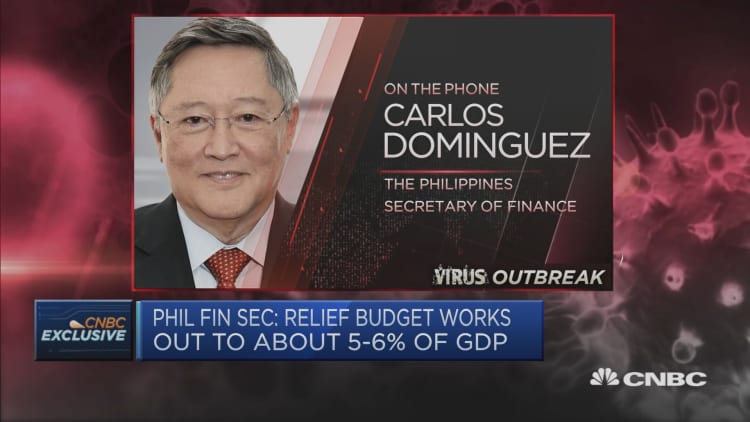The head of a Philippine news website known for its scrutiny of President Rodrigo Duterte was found guilty of "cyber libel" by a Manila court on Monday — one of the latest signs of "an orchestrated attempt" to silence critics of the Duterte government, an expert told CNBC.
Maria Ressa, chief executive and executive editor of Rappler, faces a jail term of up to six years over a 2012 article linking a wealthy Philippine businessman to murder, drug dealing, human trafficking and smuggling, reported the Associated Press.
The case is among the numerous lawsuits filed against Ressa and Rappler, and has drawn concerns globally about deteriorating press freedom in the Philippines under Duterte. The Southeast Asian country was considered by many as one of the countries in the region with the freest media before he took leadership.
"There seems to be, after this verdict, a growing threat to democracy and freedom. That's the view of a lot of people and surprisingly, even the business sector in Philippines," Victor Andres Manhit, managing director for the Philippines at advisory firm BowerGroupAsia, told CNBC's "Squawk Box Asia" on Tuesday.
... there seems to be this orchestrated attempt to silence critics of the government and it creates a chilling effect on media that has been proud ... of being the freest, vocal and critical — if needed — against any sitting government in the Philippines.Victor Andres Manhitmanaging director for the Philippines, BowerGroupAsia
Manhit pointed out that prior to Ressa's conviction, the country's leading broadcaster ABS-CBN — which has also been critical of Duterte — was forced off air last month after its license expired. The Philippine Congress, which grants such a license, reportedly sat on bills supporting the network's license renewal.
A few years earlier in 2016-2017, owners of the country's top newspaper, the Philippine Daily Inquirer, were reportedly pressured to sell the publication to a Duterte ally after publishing reports critical of the president's drug war. The deal later fell through, according to a report by Agence France-Presse.
"So, it puts into context that there seems to be this orchestrated attempt to silence critics of the government and it creates a chilling effect on media that has been proud ... of being the freest, vocal and critical — if needed — against any sitting government in the Philippines," said Manhit.
Who is Maria Ressa?
Ressa is an award-winning veteran journalist who has become a symbol of the fight for free and open media in the Philippines. Time magazine named a group of journalists for its "Person of the Year" award in 2018, and she was among those listed.
After a career that included stints at American network CNN and Philippine broadcaster ABS-CBN, she founded online news site Rappler in 2012. But Ressa and Rappler became the target of multiple legal charges following their critical reporting of the Duterte government.
The verdict on Monday, which found Ressa and another Rappler journalist guilty of cyber libel, received condemnation from a range of parties including rights groups, media watchdogs, as well as local and international politicians.
Through the verified account of its global public policy team, Twitter said "governments should not impinge on the fundamental values" of a free press.
Others criticized the cybercrime law that the journalists allegedly violated.
The law was enacted in September 2012, months after the article at the center of the lawsuit was published, and Rappler's lawyers argued that the law cannot be retroactively applied, reported AP.
But the country's Department of Justice, which brought the charges to court, said the website had updated the story in 2014 — which meant it effectively republished the article, according to the AP report.
Rappler acknowledged that it corrected a misspelled word in the article on February 2014, but said it didn't make any other changes, the report said. Ressa has denied any wrongdoing and was allowed to post bail, according to the report.
For the Philippines in particular, this is a devastating blow to a country once known for a vibrant, free press.International Center for Journalists
"This is a miscarriage of justice," read a statement by the International Center for Journalists, a Washington-based non-profit organization. "For the Philippines in particular, this is a devastating blow to a country once known for a vibrant, free press," it added.
Following the court verdict, Duterte's spokesman said the president has never filed a libel complaint against "any journalist who got on his nerves."
"He believes in free thinking, free speech, and he believes that government officials should not be onion-skinned," said Harry Roque, the presidential spokesperson, as quoted by government newswire Philippine News Agency.
Duterte's expanding power
The verdict against Ressa came as several political analysts pointed out that Duterte, who came to power in 2016, has been using the coronavirus pandemic to expand his executive powers.
Earlier this year, the country's Congress granted the president temporary sweeping powers to manage the virus outbreak, including access to billions of government funds, as well as the authority to control supplies and public utilities, reported Reuters.

In the coming days, Duterte is expected to sign into law a controversial anti-terrorism bill which critics warned could be abused to target the president's detractors.
"The Anti-Terror bill could well be the biggest blow to Philippine democracy since the end of the Marcos dictatorship," Joshua Kurlantzick, senior fellow for Southeast Asia at New York-based think tank Council on Foreign Relations, wrote in a blog post last week.
"It could easily lead to the government simply detaining any critics without charge, putting Duterte in a position not quite equal to that of Marcos — but not that far away either," he added.
Kurlantzick was referring to the dictator Ferdinand Marcos who ruled the Philippines under martial law for much of his two decades in power from 1965 to 1986. Duterte, whose track record of human rights violations is often compared to Marcos, has reportedly referred to the dictator as his idol.



